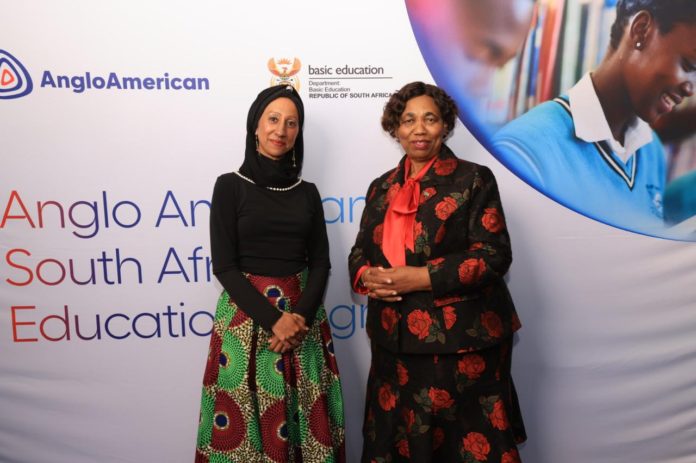
Anglo American today launched the second phase of its education programme in South Africa, in partnership with the Department of Basic Education, doubling the programme’s scope and commitment to improving educational outcomes.
The education programme is integral to Anglo American’s Sustainable Mining Plan which commits the company to a holistic range of ambitious goals that are shaping how our stakeholders experience our business. These include how we can best create Thriving Communities, by focusing on better health, education and employment opportunities for communities around our operations. Ensuring that all children in Anglo American’s host communities have access to excellent education and training is an essential gateway to tertiary education and will ultimately help increase the employability of young people throughout their working lives.
Over the past four years, the education programme has made good progress in improving the quality of education for 222 000 learners and 3 391 teachers at 109 schools and 110 early childhood development centres – investing more than R 100 million per year – within Anglo American’s host communities in South Africa through a partnership with the Department of Basic Education.
“By doubling our investment and targeting specific outcomes, we are going far beyond simply acknowledging the fundamental right of every child to quality education – we are making it happen. Supporting access to better education and school infrastructure, creating sustainable jobs, and contributing to brighter and healthier futures is one of the many ways we are delivering a lasting positive contribution, supporting communities to thrive beyond the life of our mines. Our partnerships with the Department of Basic Education and other key stakeholders are fundamental to the success of the programme and the transformational impact we can have as a responsible business,” said Nolitha Fakude, Chairperson of Anglo American’s Management Board in South Africa.
The next phase of the programme will see Anglo American investing a further R 510 million to support an additional cohort of 84 schools and about 80 early childhood development centres in the Limpopo, Northern Cape and North West provinces over the next five years. R110 million of this will be invested in infrastructure to enhance access to quality school infrastructure for learners and teachers. By 2027, Anglo American will have invested more than R1 billion in improving educational outcomes in South Africa, with the ultimate target for schools in host communities to perform within the top 20% of state schools nationally by 2030 – per the ambitions of our Sustainable Mining Plan.
Angie Motshekga, South Africa’s Minister of Basic Education, said: “South Africa has made great strides in advancing universal access to education over the past 28 years, and our journey must continue through innovative partnerships. The basic education sector is vast and for that reason, we recognise that partnerships are key to resolving some of the challenges we face as a country. Therefore, our partnership with Anglo American is a tangible example of what can be achieved when business and government partner to make a lasting difference, especially in education, which is the country’s priority focus.
The continuation of Anglo American’s impactful education programme makes the company one of the most significant private-sector contributors to South Africa’s education system. This is something we can all be proud of.”
In South Africa, the company has been instrumental in supporting education programmes – from primary to tertiary levels and has assisted with building much needed infrastructure for learning institutions across the country and has provided bursaries to students in key disciplines.
Delivering improved education outcomes
Despite the disruptions caused by Covid-19 lockdowns, the results of the programme’s first phase showed improved learner performance, above the provincial averages, for participating schools in Anglo American’s host communities in Limpopo and the Northern Cape.
- In Limpopo, the matric pass rate for participating schools in 2021 was 76%, compared to the provincial average of 66.7%. Eight out of 32 participating schools in the province were in the top 30% of national school performance, with five schools in the top 20%.
- In the Northern Cape, schools on the programme saw a 76.1% pass rate, compared to the provincial average of 71.4%. The number of students that wrote school leaving exams (matric) in 2021 was 36% higher than in 2020. This was at a time when school dropout rates tripled in South Africa.
- The programme also resulted in numerous early childhood development centres being registered to receive government subsidy support, hundreds of jobs created (both directly and indirectly), and countless small community businesses supported through the direct procurement of goods and services.
“We are looking forward to building on our success by focusing on developing well-rounded learners who can navigate the exciting future ahead of them. This can only be done if we get the fundamentals right while also supporting them to develop the skills of the future wherever they may be,” said Zaheera Soomar, Anglo American’s Global Head of Education and Community Skills.
How the programme will continue to improve learners’ educational outcomes
Over the next five years, Anglo American will invest in several initiatives, including infrastructure upgrades, information and communication technology, learner and parent supporter initiatives, career guidance, nutrition and food gardens, afterschool programmes and sporting activities in the selected schools.
In addition, the programme supports – school management teams, governing bodies, principals, and teaching staff to address some of their capacity challenges. The programme has also set ambitious learner-focused targets, including:
- 90% of learners aged five meet the minimum requirements for school readiness
- 90% of Grade 3 learners passing with at least 50% in Numeracy and Literacy
- 75% of Grade 6 learners passing with at least 50% in Mathematics and English First Additional Language
- 90% matriculation pass rate, with a 50% university entrance
- 65% of Grade 12 learners passing with at least 50% in Mathematics
The full extent of Anglo American’s Sustainable Mining Plan can be found here.











